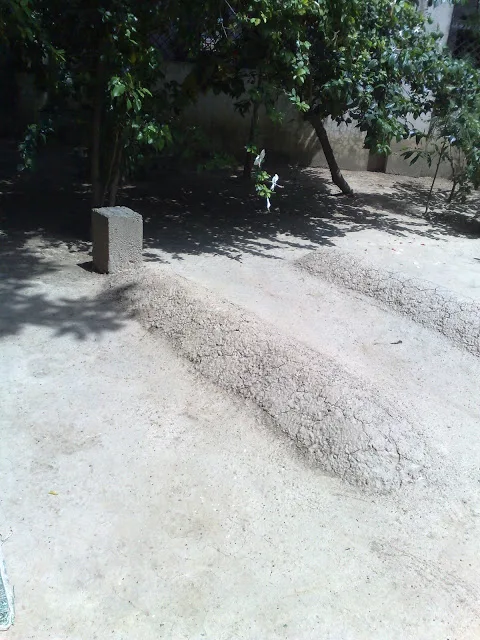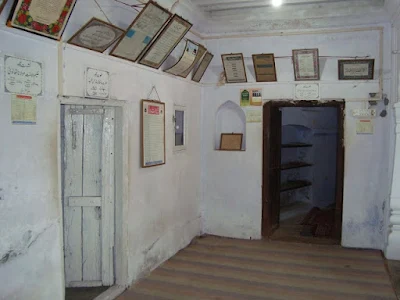Childhood
Ashraf Ali Thanawi was born on a Wednesday, Fajr time. He was a descendant of Umarfrom his father's side and a descendant of Ali from his mother's side. He lost his mother at the age of 5 and was raised by his father with special care and attention. His father taught him and his younger brother (Akbar 'Ali) discipline and good character.[2] He loved offering Salah and congregation and abstained from playing with other children. He was influenced by his teacher Mawlana Fateh Muhammad Jalandhri in offering Tahajjud and started this act of worship from the tender age of 12 or 13. He also loved Dhikr. He was reprimanded for saying that Mawlana Rafiuddeen Deobandi, the Vice-Chancellor of Darul Uloom Deobandwas not much educated.
Education
Thanawi went to Meerut for his early education in basic Persian language and the memorisation of the Qur'aan and then returned to Thana Bhawan and studied elementary Arabic with Mawlana Fateh Muhammad Jalandhari and advanced Persian with his maternal uncle, Mawlana Waajid 'Ali. He then got admitted in Darul Uloom Deoband India in 1295 and studied there for 5 years, graduating in 1301 AH (1884). During his student life, he received special attention from Mawlana Ya'qoob Nanotvi, the Sadr Madaris of Darul Uloom Deoband at that time, Grand Mufti 'Azeezu-R-Rahmaan 'Uthmani, and Mahmud al-Hasan. He was tried and tested by Rashid Ahmad Gangohi at his graduation when he visited Deoband. During his stay at Deoband, he refused invitations from his relatives and abstained from mixing with other students. He was one of the best reciters of the Qur'aan and learned Tajwid and Qira'at from Qāriʾ 'Abdullaah Muhaajir Makki, who was famous amongst the Qāris of Arabia
Spiritual reformation
Thanawi wanted to become a disciple of Rasheed Ahmad Gangohi but he was refused as he was still studying. He sent a letter to Haji Imdadullah Muhajir Makki, requesting him to command Rasheed Ahmad Gangohi to accept him as his disciple but on reading the letter, Haji Imdadullah became so impressed that he accepted Thanawi as his disciple at the age of 20. Although Haji Imdadullah was his only Shaikh (spiritual mentor), he also visited other Shaikhs like Fadlur-Rahmaan Ganj Moradabadi, Shaah Muhammad Sher Khan, Shah Sulaimaan Lajpuri, Ghulam Muhammad Deenpuri, Taj Muhammad, 'Abdul-Hayy Lucknowi, Mawlana Muhammad na'eem Firangi Mahali, Khaleel Pasha Makk
Career
After his graduation, Thanawi taught high level books of religious sciences in Faiz-e-Aam Madrasa, Kanpur.Over a short period of time, he acquired a reputable position as a religious scholar of Sufism among other subjects. His teaching attracted numerous students and his research and publications became well known in Islamic institutions. During these years, he traveled to various cities and villages, delivering lectures in the hope of reforming people. Printed versions of his lectures and discourses usually became available shortly after these tours. Until then, few Islamic scholars had had their lectures printed and widely circulated in their own lifetimes. The desire to reform the masses intensified in him during his stay at Kanpur.
Eventually, Thanwi retired from teaching and devoted himself to reestablishing the spiritual centre (khānqāh) of his shaikh in Thāna Bhāwan.
Fatwa and its refutation
In 1906, Ahmad Raza Khan issued a fatwa against Thanwi and other Deobandi leaders entitled Husam ul-Haramain (Urdu: Sword of Mecca and Medina), decrying them as unbelievers and Satanists. The fatwa was also signed by other scholars including from Hijaz.
The founding scholars of Deoband used to change their names while travelling on trains and other transportation because of threats to their lives due to the fact that their interpretations of Islam had detractors
Political ideology
Ashraf Ali Thanvi was a strong supporter of the Muslim LeagueHe and his pupils gave their entire support to the demand for the creation of Pakistan. During the 1940s, most Deobandi ulama supported the Congress in contrast to the Barelvi who largely and only supported the Muslim league, although Ashraf Ali Thanvi and some other leading Deobandi scholars including Muhammad Shafi and Shabbir Ahmad Usmani were in favour of the Muslim League. Thanvi resigned from Deoband's management committee due to its pro-Congress stance

















No comments:
Post a Comment